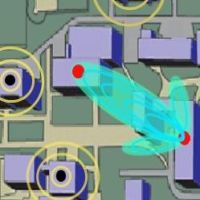Energy-Efficient Cognitive Radio Exploiting Antenna Beam-Forming for Ad-Hoc Networks
Future radio systems are required to be increasingly energy efficient, owing to the high data transmission rates, limited battery capabilities on portable devices, and a trend towards ‘green’ radio in general. One way of potentially increasing the efficiency is to use power efficient modulation, and exploiting the excess bandwidth available in many Cognitive Radio (CR) based systems. However, further significant improvement is possible by exploiting antenna directionality: transmit powers can be reduced, along with the interference caused to the environment. This project will examine how CR can be combined with antenna beamforming to improve energy efficiency of such systems.
This project will focus on the development of suitable radio access technologies, e.g. directional multichannel CSMA/CA and SDMA, which also incorporate intelligent techniques to improve channel selection, retransmission and antenna pointing. The impact of the degree of control information exchange required between different nodes and systems, possibly owned by multiple operators, will also be addressed. The benefits and drawbacks of such techniques will be compared with more conventional approaches.
A mixture of simulation and analysis will be used to assess performance. Game theory and Markov analysis will be particularly important analytical tools. This work will integrate closely with other activities within the Group.
Key objectives
- To assess the suitability of antenna beamforming to improve the energy efficiency of CR systems
- To develop directional, multichannel access schemes which incorporate intelligence techniques such as machine learning
- To quantify the performance improvements such techniques will bring
Outputs
- Intelligent, directional multichannel access schemes
- Beamforming techniques suitable for energy efficient CR devices
- Simulations and analysis showing likely performance with different communications architectures, and impact on other (including primary) users
- Contributions to conference and journal papers

Members
- Aizat Ramli
- David Grace
Dates
- Start: February 2009
Research
